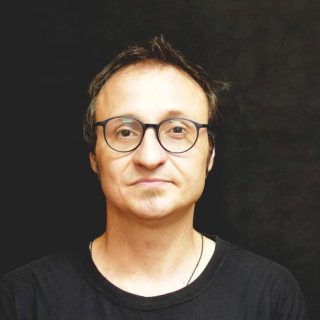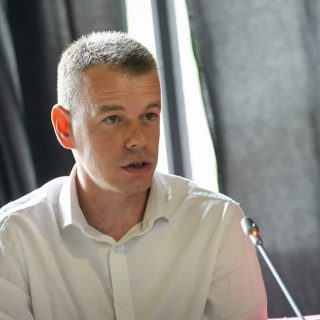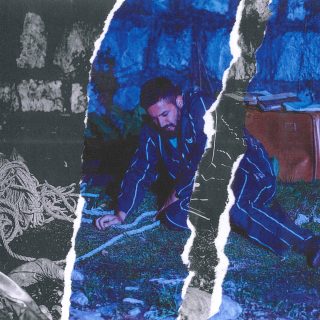Reflexion faite (‘reflecting on the past’) is an easy discursive formula for a rather complex problem. But all this reduced presentation at first glance, hides the solution of this conceptual knot. Reflecting on the past opens the door to the two central concepts of this cycle of articles: memory and history. We will not read these concepts in their vernacular use, but we will extend them to a more theoretical dimension to serve as a bridge between space, sound and identity. Therefore, each phonotope that we will describe will tell a micro-story and will bring to our memory a very layered experience of dealing with the past. After all, as Ricoeur asserts, memory has the role of a deconstructor of the empire of oblivion. And these articles will serve as a breakdown into the dust of the empire of oblivion, but at the same time they will penetrate through philosophical reading into transitional justice. The right itself, as elaborated by Derrida, has a deconstructive character because it transgresses the limits of the law in order to reconstruct them. In our case, the collective memory related to the aureal space does not remain a museum but becomes mobile, leaving a trace, in the opening of an endless dialogue.
‘The place sounds just like its inhabitants’. This quote by the German philosopher Peter Sloterdijk is more than appropriate as a prelude to this text, because it also concretizes our attempt to give meaning to the aural space of Kosovo, which holds in itself the various multi-layered experiences, whether individual or collective. We cannot reduce the entire experience of space to the exclusively phenomenological level, but we must expand the radius and see how these experiences have sedimented the shaping of different discursive formations. The most typical example of the influence of the aural space in the constitution of certain discursive formations appears in what is known in the sonosphere as political noise (Sloterdijk/Attali). The discourse, within the context we are discussing about, is loud and takes the form of a public phonotopes (Sloterdijk). We see it manifested through polarizing debates, listening to these debates, participating with some sort of exclamation in the debates or whispering in form of skepticism about the debates. Finally, this loud sonoristic articulation always takes place in a public space.
In our context, what we said above, occured in the iconic urban place of Prishtina, at the “Elida” sweet shop, a place where political parties were formed in the 1990s and where the plural narrative identity of Kosovo was established. Perhaps with a dose of skepticism we can conclude that there has been a small aperture of the transition from the identity of the “pilgrim” to the fluid identity of the “tourist”, as Zygmunt Bauman would say. We can also witness the political noise in the cafeterias at the so-called ‘Kurriz’, for example at “Hani i 2 Robertëve” which was a “hypogenum” (Astrit Salihu) often frequented by diplomats, politicians, journalists, and artists, and all of them have been part of the vortex of transformation and vocal exchange through noise. The last space has been the building of the “Kosovo Writers’ Union” where various political stakeholders held press conferences. In some way or another, all of these functioned as a stage where rumors emerged, which in our case had the function of maintaining discursive hegemony. This psycho-acoustic impulse has rendered the voices that have not been in harmony with the two camps of ‘dominant narratives’ lynched by the dominant noise. But other phonotopes have remained as areas of resistance by dominant narratives.
In our context, a clarification regarding the registers in which the concept of phonotope is used should be given, because it is quite instructive to capture the ‘narrative voice’ (Blanchot) of the text. At first, we use the concept of phonotope as a conceptual tool; a concept of the philosopher Peter Sloterdijk denoting one of his anthropogenic islands. If we were to give a reduced reading to the phonotope concept, it would have the function of outlining islands of inhabitants that are connected through aural-acoustic experience. Our momentary experiences with places and non-places, i.e., heterotopias, always transcend the acoustic experience, therefore they sound to us, as Sloterdijk would say, “just like their inhabitants or frequenters”.
The common point in our context between place and non-place in the phenomenological sense but also of heterotopias if we see them from the prism of the spatial turn is that they create conditional areas, say for the inhabitants of the islands (Sloterdijk) who through their vital elan create these islands. The creation of these islands also means the creation of narrative identities, memory as a poetic image of the inner experience that they represent, up to the manifestation of sound, song, and voice that aim to suspend oblivion. These islands, through the power of sound and ear, have established the narrative voice of the generations that have lived but also of those that are coming, which according to Derrida would be defined as l’avenir.
In our local context, two phonotopes have prevailed over the rest: first, there is the “Oda” (Eng: chambers) that has marked the material repetition of mobilization, unity and homogeneity, and second, there are “cafeterias” or in the slang of Prishtina known as “kafiça” (Eng: pubs) that have marked a diverse, heterogeneous and plural culture, therefore, there is the influence of micro-histories and subcultures for the creation of narrative identity. These first ones have affirmed the necessary identity as a mobilizing power, while the latter have affirmed the fluidity and elasticity of everyday life to enter the domain of narratological identity. At the same time, we have other phonotopes such as garages and basements as places where bands practiced, then clubs where we immersed ourselves in hyperreality through ‘Technos’, as well as New Year’s tapes that represented the ‘vulgus aesthetic’, up to alternative radios that have served as subversive areas like ‘paideia theater‘ (Benjamin) and many other phontotopia that shape the spirit of the place [genius loci] but also the voice of the place [vox loci].
These phonotopes, for islanders like us, have also shaped the consciousness of our existence/our being in the world or lifeworld [Lebenswelt]. They have cemented the inner voices of homo-silens, but at the same time they have affirmed parrhesia, which, to put it briefly, is: to speak freely (candid speech). Freedom in its subtle meaning can only be manifested through the musical experience, therefore ‘life without music, sounds, acoustics, and shouts, would be a big mistake.’
Labinot Kelmendi is a philosopher coming from Prishtina. He earned his MA in Philosophy from University of Prishtina, Faculty of Philosophy, Department of Philosophy, and is currently pursuing his PhD in Philosophy at the Faculty of Philosophy of the University of Zagreb. Presently, he serves as an assistant in the Faculty of Philosophy (Department of Philosophy) and the Faculty of Arts. Additionally, he holds a position on the presidency of the Kosovo Philosophical Association. From 2015 to 2021, he co-authored Kosovo’s first philosophical telecast, “Filozofema,” aired on Radio Television of Kosovo (RTK). He chairs the International Inter- and Trans-Disciplinary Symposium for Philosophy, Art, and Technology, known as “Filozofema.” Beyond academia, he actively engages in the cultural realm, initially as a member of various bands and alternative music projects, including the popular “Madgod” and “Elektorati Intelektual.” Subsequently, he contributed articles to the “Cineks” platform, offering critiques on local films and serving as curator and art critique for the drawing biennial and other exhibitions.




